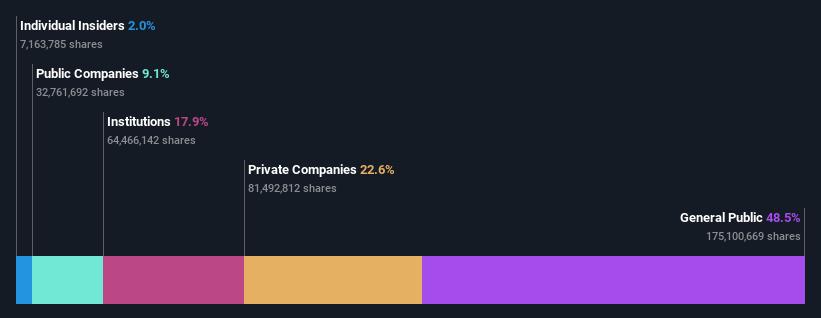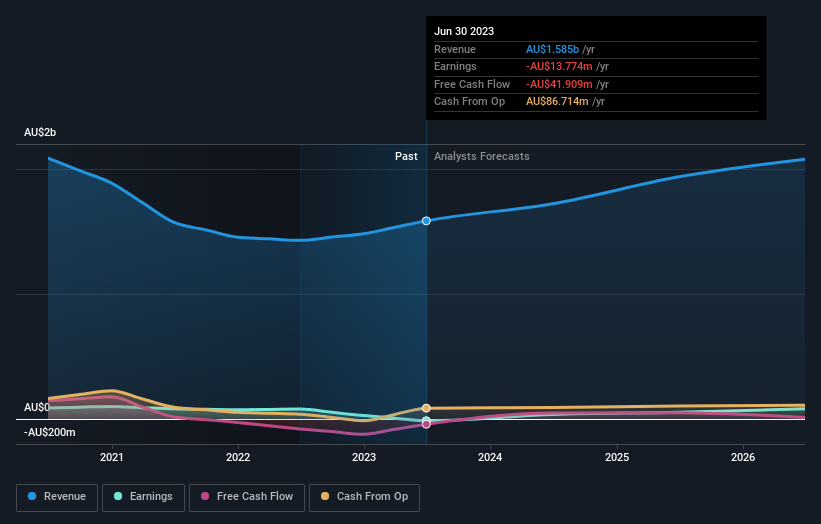Individual investors account for 49% of Austal Limited's (ASX:ASB) ownership, while private companies account for 23%
Key Insights
Austal's significant individual investors ownership suggests that the key decisions are influenced by shareholders from the larger public
50% of the business is held by the top 23 shareholders
18% of Austal is held by Institutions
To get a sense of who is truly in control of Austal Limited (ASX:ASB), it is important to understand the ownership structure of the business. And the group that holds the biggest piece of the pie are individual investors with 49% ownership. Put another way, the group faces the maximum upside potential (or downside risk).
Meanwhile, private companies make up 23% of the company’s shareholders.
In the chart below, we zoom in on the different ownership groups of Austal.
Check out our latest analysis for Austal

What Does The Institutional Ownership Tell Us About Austal?
Many institutions measure their performance against an index that approximates the local market. So they usually pay more attention to companies that are included in major indices.
Austal already has institutions on the share registry. Indeed, they own a respectable stake in the company. This suggests some credibility amongst professional investors. But we can't rely on that fact alone since institutions make bad investments sometimes, just like everyone does. When multiple institutions own a stock, there's always a risk that they are in a 'crowded trade'. When such a trade goes wrong, multiple parties may compete to sell stock fast. This risk is higher in a company without a history of growth. You can see Austal's historic earnings and revenue below, but keep in mind there's always more to the story.

Austal is not owned by hedge funds. Our data shows that Tattarang Ventures Pty Ltd is the largest shareholder with 20% of shares outstanding. With 9.1% and 4.6% of the shares outstanding respectively, enX Group Limited and BlackRock, Inc. are the second and third largest shareholders.
After doing some more digging, we found that the top 23 have the combined ownership of 50% in the company, suggesting that no single shareholder has significant control over the company.
While it makes sense to study institutional ownership data for a company, it also makes sense to study analyst sentiments to know which way the wind is blowing. There are plenty of analysts covering the stock, so it might be worth seeing what they are forecasting, too.
Insider Ownership Of Austal
The definition of an insider can differ slightly between different countries, but members of the board of directors always count. Management ultimately answers to the board. However, it is not uncommon for managers to be executive board members, especially if they are a founder or the CEO.
I generally consider insider ownership to be a good thing. However, on some occasions it makes it more difficult for other shareholders to hold the board accountable for decisions.
Shareholders would probably be interested to learn that insiders own shares in Austal Limited. As individuals, the insiders collectively own AU$13m worth of the AU$635m company. This shows at least some alignment. You can click here to see if those insiders have been buying or selling.
General Public Ownership
With a 49% ownership, the general public, mostly comprising of individual investors, have some degree of sway over Austal. This size of ownership, while considerable, may not be enough to change company policy if the decision is not in sync with other large shareholders.
Private Company Ownership
It seems that Private Companies own 23%, of the Austal stock. Private companies may be related parties. Sometimes insiders have an interest in a public company through a holding in a private company, rather than in their own capacity as an individual. While it's hard to draw any broad stroke conclusions, it is worth noting as an area for further research.
Public Company Ownership
Public companies currently own 9.1% of Austal stock. This may be a strategic interest and the two companies may have related business interests. It could be that they have de-merged. This holding is probably worth investigating further.
Next Steps:
While it is well worth considering the different groups that own a company, there are other factors that are even more important. Consider for instance, the ever-present spectre of investment risk. We've identified 1 warning sign with Austal , and understanding them should be part of your investment process.
Ultimately the future is most important. You can access this free report on analyst forecasts for the company.
NB: Figures in this article are calculated using data from the last twelve months, which refer to the 12-month period ending on the last date of the month the financial statement is dated. This may not be consistent with full year annual report figures.
Have feedback on this article? Concerned about the content? Get in touch with us directly. Alternatively, email editorial-team (at) simplywallst.com.
This article by Simply Wall St is general in nature. We provide commentary based on historical data and analyst forecasts only using an unbiased methodology and our articles are not intended to be financial advice. It does not constitute a recommendation to buy or sell any stock, and does not take account of your objectives, or your financial situation. We aim to bring you long-term focused analysis driven by fundamental data. Note that our analysis may not factor in the latest price-sensitive company announcements or qualitative material. Simply Wall St has no position in any stocks mentioned.
